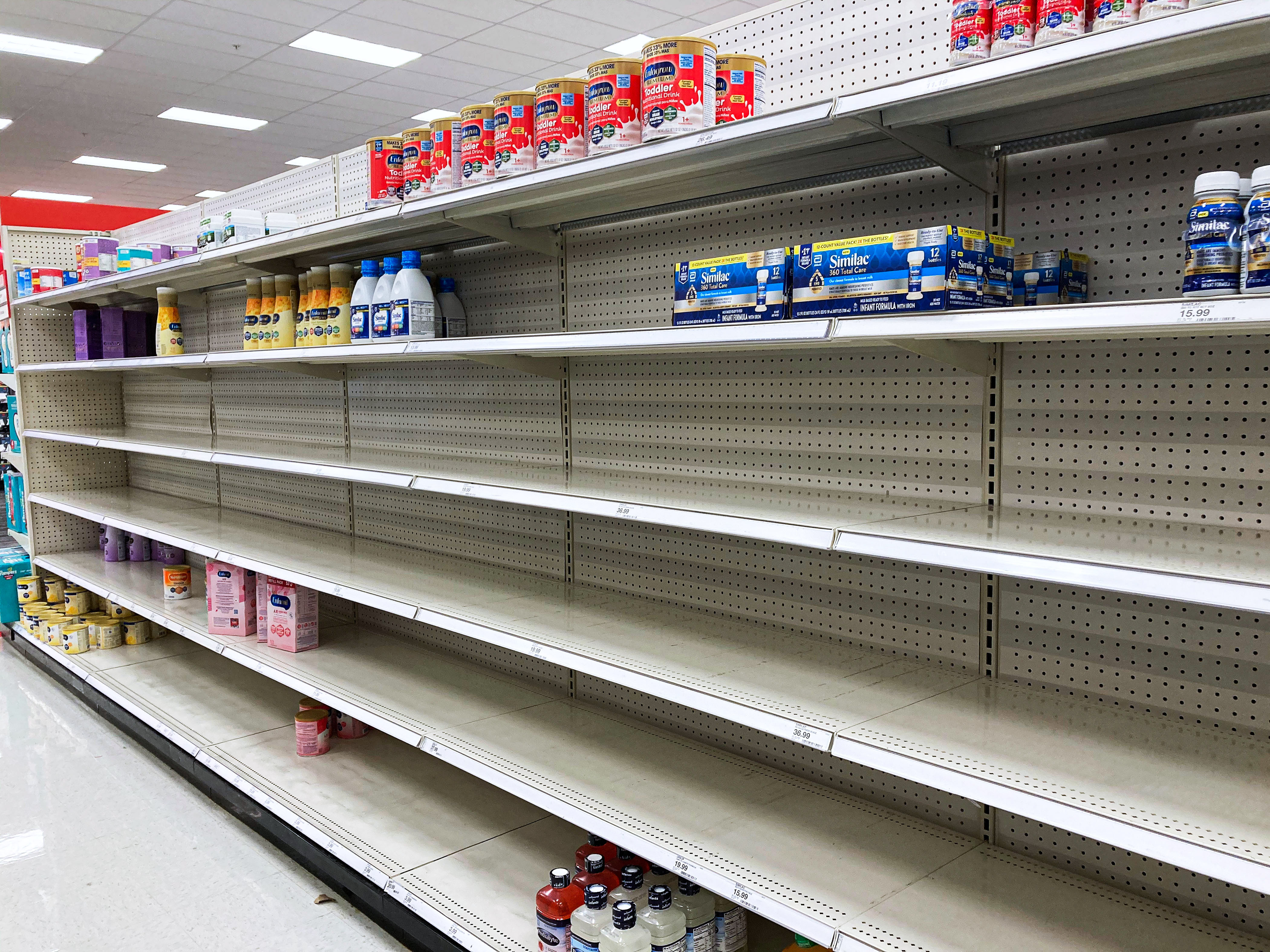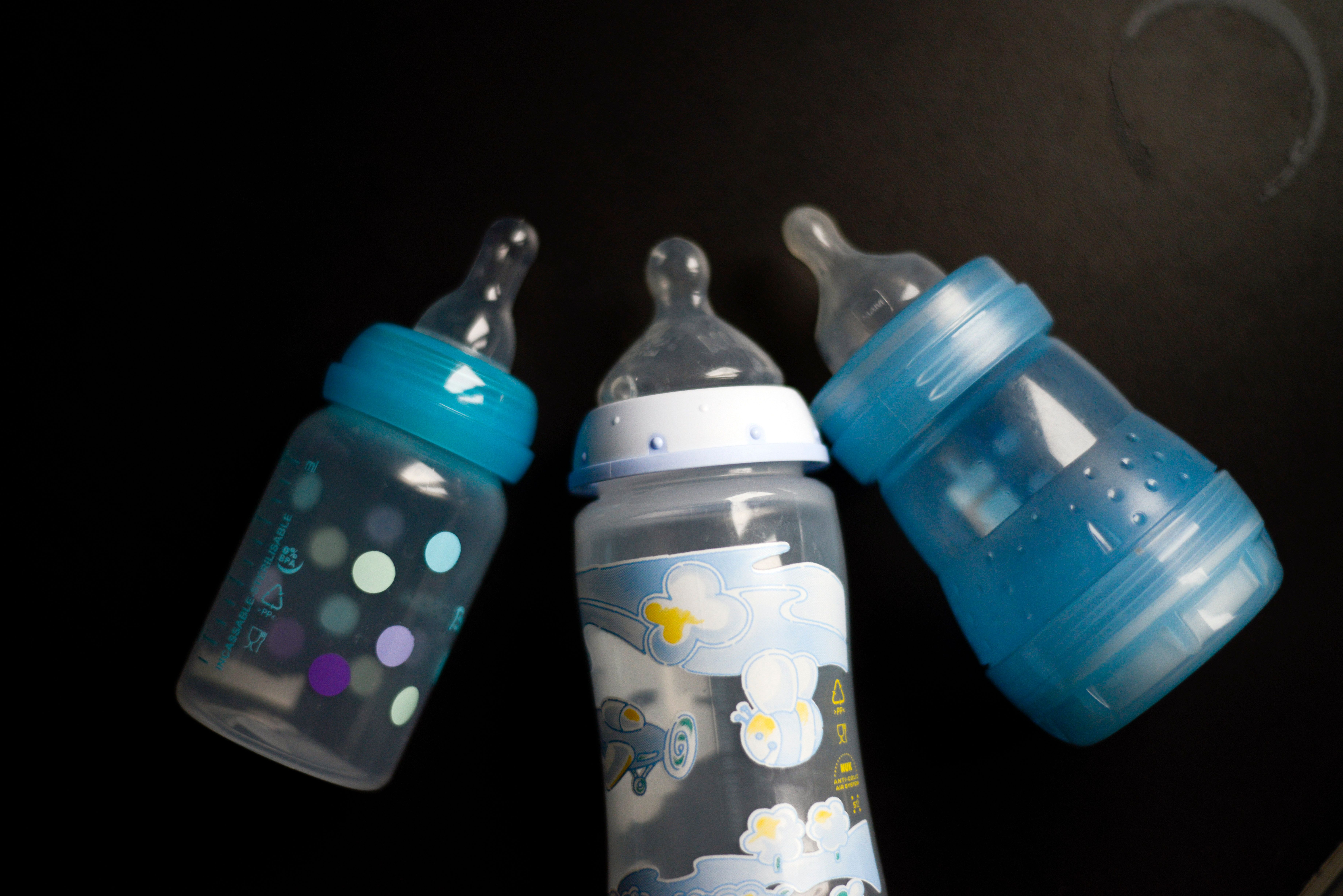As parents across the U.S. are scrambling to find baby formula because of supply disruptions, the Food and Drug Administration announced Tuesday it would allow some formula products from the shuttered Abbott facility in Michigan to be released on a "case-by-case" basis.
In February, the FDA warned parents not to use certain popular powdered infant formulas manufactured at Abbott's Sturgis plant after receiving four reports of infants who were hospitalized with bacterial infections after consuming formula from the facility. Two of the infants died.
Abbott subsequently issued a recall of all potentially affected products manufactured at the facility and the FDA later shut down the plant after federal safety inspectors found Abbott failed to maintain sanitary conditions and procedures at the facility.
Last month, however, the FDA and Centers for Disease Control and Prevention told NBC News none of the bacterial strains taken at the Abbott plant matched those collected from the infants, and the agencies haven't offered an explanation for how the contamination occured.
Get Philly local news, weather forecasts, sports and entertainment stories to your inbox. Sign up for NBC Philadelphia newsletters.
For its part, Abbott says its formula “is not likely the source of infection,” though the FDA says its investigation continues.
More Baby Formula Shortage Coverage:
Baby formula is particularly vulnerable to disruptions because just a handful of companies account for almost the entire U.S. supply, according to the Associated Press. The closure of the Abbott facility, the company's largest U.S. formula manufacturing plant, exacerbated the supply shortage.
The shortages are especially dangerous for infants who require specialty formulas due to food allergies, digestive problems and other conditions.
“Unfortunately, many of those very specialized formulas are only made in the United States at the factory that had the recall, and that's caused a huge problem for a relatively small number of infants," said Dr. Steven Abrams, of the University of Texas, Austin.
Now, the FDA is saying it will not object "to Abbott Nutrition releasing product to individuals needing urgent, life-sustaining supplies of certain specialty and metabolic formulas on a case-by-case basis."
Here's what you need to know about the nationwide baby formula shortage, what Abbott products were previously recalled and how to obtain speciality formulas from the Sturgis facility:
Which formulas from Abbott have been cleared for release by the FDA?
The FDA said Abbott could begin releasing some specialty formulas not affected by the recalls “on a case-by-case basis."
"The FDA is concerned that the risk of not having certain specialty and metabolic products available could significantly worsen underlying medical conditions and in some cases pose life-threatening risks for infants and individuals who rely on these products," the agency said in a statement. "In these circumstances, the benefit of allowing parents, in consultation with their healthcare providers, to access these products may outweigh the potential risk of bacterial infection."
The agency has given Abbott discretion , depending on product availability and the severity of the individual’s need. The specialty and metabolic formulas that may be released are:
- Glutarex-1
- Glutarex-2
- Cyclinex-1
- Cyclinex-2
- Hominex-1
- Hominex-2
- I-Valex-1
- I-Valex-2
- Ketonex-1
- Ketonex-2
- Phenex-1
- Phenex-2
- Phenex-2 Vanilla
- Pro-Phree
- Propimex-1
- Propimex-2
- ProViMin
- Calcilo XD
- Tyrex-1
- Tyrex-2
- Similac PM 60/40
How do I order the baby formula and what will it cost?
Patients and caregivers seeking access to these products should contact Abbott directly to request that a product be made available to them by calling 1-800-881-0876.
The company is providing them free of charge, in coordination with physicians and hospitals.
The FDA said parents should talk to their pediatricians before using the formula and is still advising consumers not to use the products impacted by the February recall.
Which baby formula brands were affected by the Abbott recall?
In February, Abbott recalled certain lots of Similac, Alimentum and EleCare with expiration dates of April 1, 2022, or later. The product was distributed throughout the U.S. and overseas, the company said in a statement.
Abbott said parents can identify the recalled products by examining the number on the bottom of each container. The affected formulas have a number starting with 22 through 37, contain K8, SH, or Z2 and have an expiration date of April 1, 2022 or later. The company has also setup a website here where parents can check if their products have been recalled.
The recall does not affect liquid infant formulas or any other Abbott products.
What caused the baby formula shortage and what's being done about it?
Industry executives say the constraints began last year as the COVID-19 pandemic led to disruptions in ingredients, labor and transportation. Supplies were further squeezed by parents stockpiling during lockdowns.
Months of spot shortages at pharmacies and supermarkets were aggravated by the recall at Abbott, which swept many leading brands off store shelves.
The Abbott recall has also been particularly hard-hitting for families who rely on public benefits such as the Special Supplemental Nutrition Program for Women, Infants and Children (WIC) because the company was the exclusive supplier for more than half of the WIC agencies nationwide, according to The New York Times. The program is currently allowing substitutions for WIC-covered brands.
Nationwide about 40% of large retail stores are out of stock, up from 31% in mid-April, according to Datasembly, a retail data firm. More than half of U.S. states are seeing out-of-stock rates between 40% and 50%, according to the firm, which collects data from 11,000 locations.
Retailers including CVS and Walgreens have begun limiting purchases to three containers per customer.
The FDA said Tuesday it was working with U.S. manufacturers to increase their output and streamlining paperwork to allow more imports. Among other steps, the FDA said it was waiving enforcement of minor product labeling issues to increase availability of both U.S. and imported products.
Chicago-based Abbott said it is increasing production at its other facilities to fill the gap, including air-shipping formula from a plant in Ireland.
What can parents do?
For parents desperate to secure a regular supply of baby formula for their children, and are having difficulty obtaining a single can, the Infant Nutrition Council of America advises that they contact their local food pantries, churches, shelters and hospital emergency rooms as they may provide small amounts of infant formula in emergency situations.
Parents can contact Feeding America or dial 2-1-1 to be connected to a community resource specialist who can help you find local resources.
Pediatricians and the federal health officials warn against watering down formula to stretch supplies or using online DIY recipes.
“For babies who are not being breastfed, this is the only thing they eat," said Abrams. "So it has to have all of their nutrition and, furthermore, it needs to be properly prepared so that it’s safe for the smallest infants.”
The Associated Press contributed to this report.



